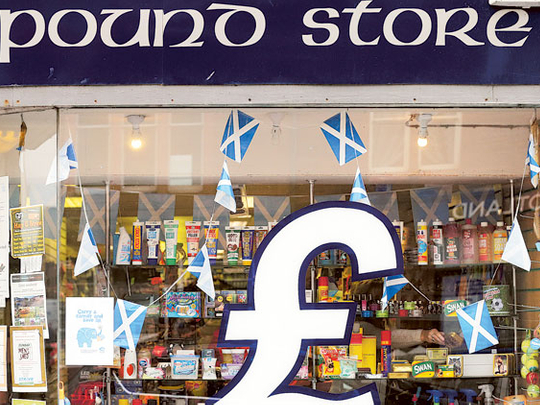
London: The British pound hit a two-year euro peak on Friday, but trimmed gains as official results showed that Scotland has rejected independence, in line with early indications.
In Asian deals at 0140 GMT, the euro tumbled to 0.7810 pounds on initial returns pointing to a victory for the “No” camp. That was the lowest level since July 2012 and compared with 0.7882 late in New York on Thursday.
At the same time, sterling jumped to a two-and-a-half-week peak at $1.6525, and also hit a six-year high of 180.71 yen.
However, at about 0530 GMT, the euro stood at 0.7840 pounds, while the pound pulled back to $1.6450 and 179.42 yen.
“Scotland has voted against independence overnight in a move that has removed a great weight from the shoulders of sterling,” said economist Simon Smith at trading group FxPro.
Preliminary results showed that the “No” camp was ahead by 55.42 per cent to 44.58 per cent for the “Yes” camp, with 31 out of 32 local areas counted.
The referendum leaves the United Kingdom intact but also opens the door to wider autonomy following a huge turnout.
“It’s a relief rally (for the pound), and had there been a ‘Yes’ I think a drop to below $1.60, possibly even $1.55 as well, (would have been possible) given the uncertainty that would come into the equation, regarding currency, debt splits, division of assets and the question over the validity of a 2015 general election,” said analyst Chris Beauchamp at trading firm IG.
He added the pound moved higher due to increasing expectations of an interest-rate increase from the Bank of England (BoE) next year.
“The ‘No’ vote arguably makes a rate hike more of a possibility in 2015, given that separation negotiations would have stayed the BoE’s hand on rates, so this is why the pound is seeing another move higher against the euro,” Beauchamp told AFP.
The British unit had suffered a sell-off in the past week after an opinion poll showed a majority of Scots in favour of leaving the 307-year-old union, which could have hammered the economy.
In July, sterling hit its highest level against the dollar since 2008 during the financial crisis, but then plummeted to a 10-month low as polls showed strong gains for the “Yes” campaign.












